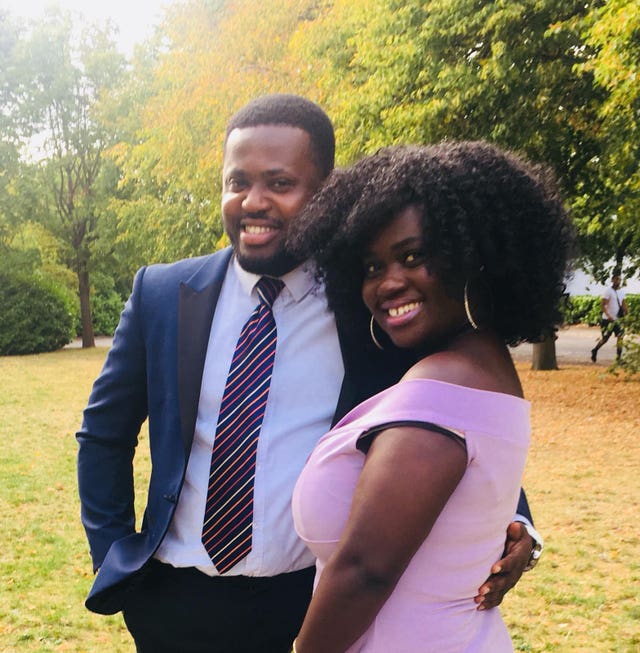Pregnant nurse, 28, felt ‘pressured’ to work despite her concerns, inquest told
Mary Agyeiwaa Agyapong was heavily pregnant but was still working at Luton and Dunstable University Hospital as the coronavirus pandemic broke out.

A heavily-pregnant nurse working with Covid patients at the start of the pandemic felt “pressured” to return to work despite concerns for her safety, her inquest heard.
Mary Agyeiwaa Agyapong, 28, was a sister at Luton and Dunstable University Hospital and worked on the wards up until March 12 2020 when she was signed off work with back problems, her widower Ernest Boateng told Bedfordshire and Luton Coroner’s Court.
But Mr Boateng said she continued to go in to hospital to confirm her ill-health, and to attend medical appointments.
Ms Agyapong was admitted to hospital with breathing difficulties on April 5, but was discharged later that day – something she was unhappy with – and was readmitted two days later with coronavirus symptoms, at 35 weeks’ pregnant.

Surgeons safely delivered the baby, also named Mary, by Caesarean section before Ms Agyapong was transferred to the intensive care unit, where she died on April 12.
The preliminary cause of death was given as pneumonia and Covid-19.
Giving evidence to the inquest, Mr Boateng said: “Mary continued to work during this time (the start of the coronavirus outbreak), but she was very concerned about the situation involving Covid-19, so much so that when she came home from work she would take her clothes off at the front door and take a shower immediately.
“She was very worried about bringing Covid into the home.”
Mr Boateng, a mental health worker currently studying for a Masters in law, said she also began sleeping in the spare room at the family home to protect her husband and their son, AJ.
Mr Boateng, 30, added: “She told me the staff were very scared about the virus because they were on the front line and likely to come into contact with Covid-19 patients.
“I wanted her to stay at home. But due to high demand at the hospital, she had to continue working.
“She tried to reassure me that everything would be okay but I could understand she was anxious and panicking deep down.”
Mr Boateng said he strongly believed his wife, originally from Ghana, contracted coronavirus while at work.
He said: “My understanding is Mary was being pressurised to get back to work, as she had meetings about her sickness records earlier that year.”
He said Ms Agyapong “struggled” with her second pregnancy and “continued to work long, 12-hour shifts”.
“She found it very tiring and difficult,” he said.
The inquest heard Ms Agyapong was signed off sick from March 13, and never returned to work as she then took four weeks’ annual leave before her maternity leave was due to begin.
Ward 12, where Ms Agyapong worked, was split in half on March 18 to accommodate coronavirus patients, the hearing was told, although there was no infection on the ward at this time.
Jonathan Holl-Allen QC, for Bedfordshire Hospitals NHS Foundation Trust, asked Nicola Hinselwood, Ms Agyapong’s senior colleague on ward 12: “Was there any question of Mary being pressured either to return to work or to remain at work?”
Ms Hinselwood replied: “Not to my knowledge.”
Mr Boateng said he was not allowed onto the maternity ward to be with his wife when she gave birth to their daughter on April 7 and described the huge impact of her death on the family.
He said: “What was supposed to be a happy moment in our lives quickly changed into a traumatic and painful loss.
“Every day my children have to deal with the loss of their mother and I feel helpless when AJ asks when he can see his mother again.”
Dr William Manning, who assessed Ms Agyapong on her initial admission to hospital on April 5, said he “suspected she had Covid-19”, but decided to send her home.
He said: “At the time, if a patient did not require oxygen therapy, they did not require admission to hospital.
“I decided Mary should be discharged.”
Dr Manning added: “She didn’t seem particularly happy to go home.”
The inquest opened on Tuesday, on a national day of reflection to remember those affected by the coronavirus pandemic.
The hearing, before senior coroner Emma Whitting, was adjourned until Wednesday.





